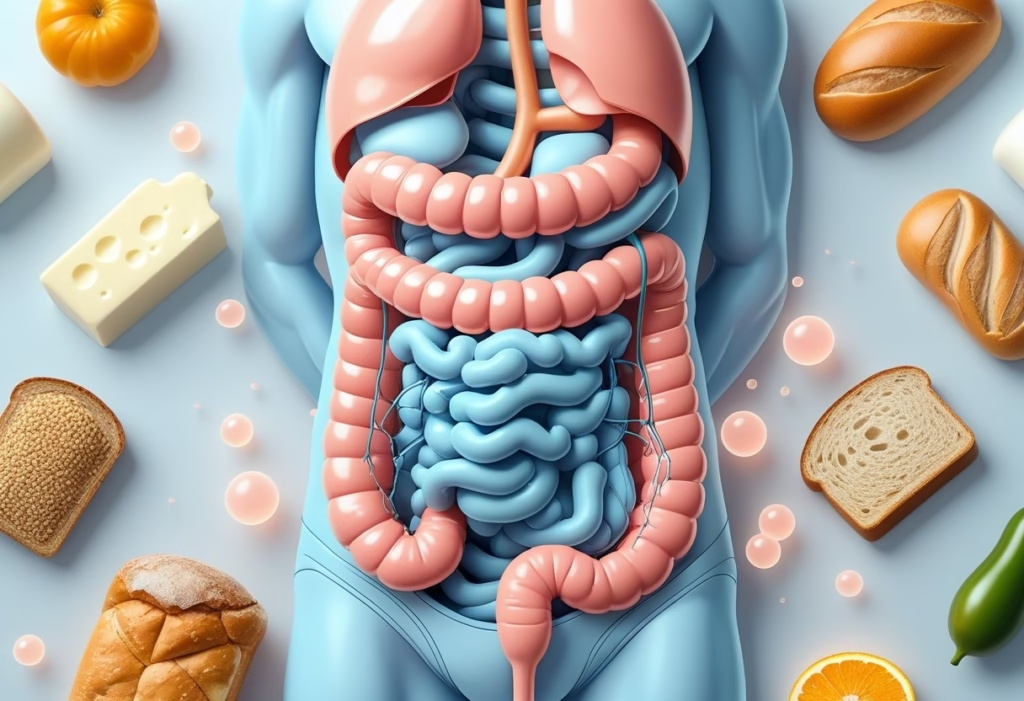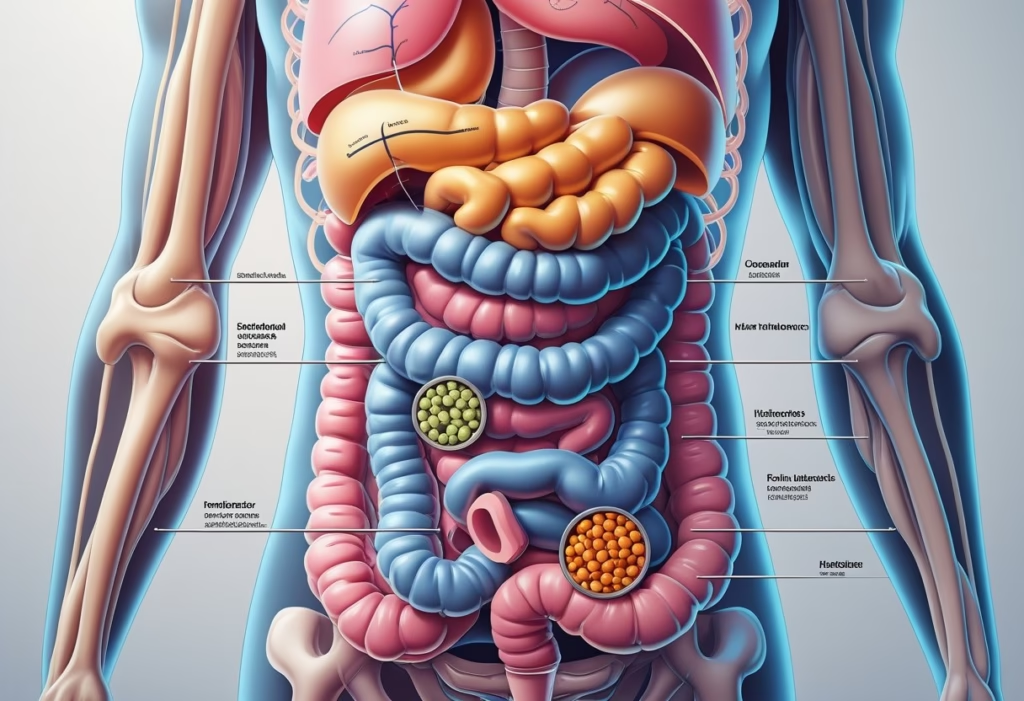Passing gas is normal, but if you’ve noticed yours has become particularly foul-smelling, the culprit might be hiding in your diet. Food intolerances directly contribute to smelly gas because your body lacks the necessary enzymes to properly break down certain foods, leading to bacterial fermentation in your gut that produces sulfur-containing compounds like hydrogen sulfide.

Many people confuse food intolerances with allergies, but they’re distinct issues. While allergies trigger immune responses, food intolerances involve difficulty digesting specific foods, which leads to uncomfortable symptoms including excessive, odorous flatulence. Common intolerances like lactose and gluten sensitivity are frequent offenders, though you might be reacting to foods you’d never suspect.
Understanding the connection between what you eat and why your gas smells can help you identify problem foods and find real relief. This article will explain the science behind foul-smelling flatulence, reveal which everyday foods commonly trigger symptoms in sensitive individuals, and provide practical strategies that actually work to reduce both the frequency and odor of your gas. This information is for educational purposes and should not replace medical advice from a healthcare professional.
How Food Intolerances Cause Smelly Gas

When your body cannot properly digest certain foods, undigested particles reach your colon where bacteria break them down through fermentation, releasing sulfur compounds and other gases that create distinctive odors. The specific smell and volume of gas depends on which food component your digestive system struggles to process.
Lactose Intolerance and Gas Odor
Lactose intolerance occurs when your small intestine doesn’t produce enough lactase enzyme to break down lactose, the sugar in dairy products. When undigested lactose reaches your colon, bacteria ferment it rapidly, producing hydrogen, methane, and carbon dioxide gases.
The fermentation process creates particularly foul-smelling gas because the bacteria also release short-chain fatty acids and sulfur-containing compounds. You’ll typically notice symptoms within 30 minutes to 2 hours after consuming dairy.
Common mistakes include:
- Thinking all dairy affects you equally (hard cheeses contain less lactose than milk)
- Consuming lactose on an empty stomach, which speeds transit time
- Not recognizing hidden dairy in processed foods and medications
Taking lactase supplements before eating dairy usually helps, while avoiding dairy completely rarely proves necessary since many people tolerate small amounts. Lactose intolerance represents one of the most common food intolerances affecting gas production.
Gluten Sensitivity and Flatulence
Gluten sensitivity differs from celiac disease but still causes digestive distress when you consume wheat, barley, or rye. Your intestines become inflamed and struggle to absorb nutrients properly, leading to excessive gas that often smells particularly bad.
The inflammation damages your intestinal lining, allowing partially digested proteins to reach your colon. Bacteria then ferment these proteins, producing ammonia and sulfur compounds that create a rotten egg smell.
What makes symptoms worse:
- Eating large portions of gluten-containing foods
- Combining gluten with high-fat meals, which slow digestion
- Consuming gluten when you’re already stressed or tired
You should see a doctor if you experience weight loss, severe abdominal pain, or bloody stools alongside gas symptoms. Complete gluten elimination usually helps within 2-4 weeks, though occasional exposure can trigger symptoms for days. Digestive enzymes marketed for gluten rarely help because the issue involves immune response and inflammation, not just enzyme deficiency.
Fructose and FODMAP Intolerances
Fructose intolerance occurs when your small intestine cannot absorb this fruit sugar efficiently. Foods high in fructose include apples, pears, honey, and high-fructose corn syrup. When fructose reaches your colon undigested, bacteria ferment it into hydrogen and methane gases.
FODMAPs (Fermentable Oligosaccharides, Disaccharides, Monosaccharides, and Polyols) are short-chain carbohydrates that many people struggle to digest. These foods can ferment in the colon, producing gas as a byproduct.
High-FODMAP foods that commonly cause smelly gas:
| Food Category | Common Culprits |
|---|---|
| Vegetables | Onions, garlic, broccoli, cabbage |
| Fruits | Apples, watermelon, cherries |
| Legumes | Beans, lentils, chickpeas |
| Sweeteners | Sorbitol, mannitol, xylitol |
The gas from FODMAP fermentation often smells worse in the evening because food takes 6-8 hours to reach your colon. Eating smaller portions throughout the day usually helps more than eliminating entire food groups. Working with a dietitian trained in the low-FODMAP diet rarely proves necessary unless you have severe symptoms affecting your quality of life.
Medical Disclaimer: This information is for educational purposes only and does not replace professional medical advice. Consult a healthcare provider for proper diagnosis and treatment of digestive symptoms.
The Science Behind Foul-Smelling Gas

Gas becomes particularly odorous when gut bacteria break down certain food components and produce sulfur-containing compounds like hydrogen sulfide. The intensity of the smell depends on what you eat, how well you digest it, and which bacterial species dominate your gut microbiome.
Role of Gut Bacteria in Gas Production
Your large intestine contains trillions of bacteria that ferment food particles your small intestine couldn’t break down. When these bacteria metabolize proteins and carbohydrates, they release various gases as byproducts.
Different bacterial species produce different gases. Some generate odorless carbon dioxide and hydrogen, while others create smelly compounds. People with inflammatory bowel disease have been shown to have smellier farts due to unfavorable changes in their gut bacteria composition.
The balance of bacteria in your gut shifts based on your diet, medications, and overall health. When beneficial bacteria decrease and harmful species increase, gas production typically becomes more excessive and foul-smelling. Conditions like SIBO occur when bacteria overgrow in the small intestine, leading to excessive fermentation and particularly odorous gas before food even reaches the colon.
Sulfur Compounds and Odor Formation
The pungent smell of gas comes primarily from sulfur-containing compounds, especially hydrogen sulfide. This gas has the characteristic rotten egg odor that makes flatulence so unpleasant.
Gut bacteria produce hydrogen sulfide when breaking down sulfur-rich foods like cruciferous vegetables, eggs, and meat. Recent research has identified specific intestinal microbes that feed on taurine and produce this toxic gas as a metabolic byproduct.
Foods highest in sulfur include:
- Broccoli, cauliflower, and Brussels sprouts
- Eggs and dairy products
- Beef, chicken, and fish
- Garlic and onions
The more sulfur-containing foods you consume at once, the more raw material your gut bacteria have to create these malodorous compounds.
Fermentation of Undigested Carbohydrates
When your small intestine can’t fully digest certain carbohydrates, they travel intact to your colon where bacteria ferment them. This fermentation process produces gas with varying degrees of odor.
People with lactose intolerance can’t break down milk sugar, so it reaches the colon undigested. Bacteria then ferment this lactose, creating excess gas along with bloating and diarrhea. The same process occurs with fructose intolerance when eating high-fructose fruits.
High-fiber foods undergo similar fermentation. While fiber is essential for digestive health, suddenly increasing your intake gives bacteria more fuel to ferment, temporarily making your gas smell worse. Your gut microbiome needs time to adjust to processing larger amounts of fiber efficiently.
Medical Disclaimer: This information is for educational purposes only and does not constitute medical advice. Consult a healthcare provider if you experience persistent foul-smelling gas with other symptoms like unintentional weight loss, severe abdominal pain, or bloody stools.
Other Factors That Worsen Smelly Gas
Beyond food intolerances, several digestive issues can amplify gas odor by disrupting normal bacterial fermentation and slowing waste movement through your intestines. These factors often interact with existing intolerances to create more severe symptoms.
Constipation and Gas Retention
When stool remains in your colon for extended periods, intestinal bacteria have more time to ferment the waste material, producing higher concentrations of hydrogen sulfide and other sulfur compounds. This prolonged fermentation directly increases both the volume and smell of gas you produce.
Constipation leads to increased fermentation because the stagnant waste creates an ideal environment for gas-producing bacteria. You might notice that your gas becomes particularly foul-smelling after several days without a bowel movement.
The trapped gas also builds up pressure in your intestines, which can worsen bloating and discomfort. Many people with constipation report that their gas issues resolve within 24-48 hours after normal bowel movements resume. If you experience chronic constipation with persistent foul gas, you should consult a gastroenterologist to rule out underlying motility disorders.
Medications Impacting Digestion
Antibiotics are the most common medications that worsen gas odor because they indiscriminately kill both harmful and beneficial gut bacteria. This disruption allows opportunistic bacteria that produce more sulfur-containing gases to proliferate temporarily.
Certain medications can disrupt gut bacteria balance, leading to increased gas production during and after treatment. The effect typically persists for 2-4 weeks after finishing an antibiotic course as your microbiome rebalances.
Other medications that commonly worsen gas include metformin for diabetes, which alters bacterial populations, and medications containing sorbitol or other sugar alcohols as inactive ingredients. Proton pump inhibitors for acid reflux can also change stomach pH, affecting how thoroughly proteins are broken down before reaching your intestines.
Digestive Disorders and Bacterial Overgrowth
Small intestinal bacterial overgrowth (SIBO) occurs when bacteria from your colon migrate upward into your small intestine, where they ferment food before proper digestion occurs. This creates excessive gas with a particularly sulfurous odor because fermentation happens earlier in the digestive process.
Irritable bowel syndrome frequently overlaps with food intolerances and can produce unusually foul-smelling gas due to altered gut motility and bacterial composition. You may notice symptoms worsen during stress or after specific trigger foods.
Gastritis can indirectly affect gas production by impairing your stomach’s ability to break down proteins and other nutrients properly. This forces your intestinal bacteria to work harder on undigested material, producing more sulfur compounds.
When to see a doctor:
- Gas accompanied by unexplained weight loss
- Persistent diarrhea or blood in stool
- Severe abdominal pain that doesn’t improve
- Gas symptoms that suddenly worsen without dietary changes
Medical disclaimer: This information is for educational purposes and doesn’t replace professional medical advice. Consult your healthcare provider for diagnosis and treatment of digestive disorders.
Common Foods That Trigger Smelly Gas in Sensitive Individuals
Certain foods contain compounds that bacteria in your colon break down into sulfur-containing gases, which produce distinctly unpleasant odors. Dietary choices largely influence excessive smelly gas, particularly when you have an underlying intolerance that prevents proper digestion.
Dairy Products
If you’re lactose intolerant, your small intestine doesn’t produce enough lactase enzyme to break down lactose, the sugar in milk. This unabsorbed lactose becomes fuel for gas-producing bacteria, leading to particularly odorous flatulence.
The smell intensifies because these bacteria produce hydrogen sulfide during fermentation. Even small amounts of dairy can trigger symptoms if your lactose intolerance is severe. A common mistake is assuming you need to avoid all dairy products completely.
Lactose-free versions of milk, cheese, and yogurt contain the same nutrients without the problematic sugar. Taking lactase tablets before consuming regular dairy can also prevent symptoms. Hard cheeses like cheddar and parmesan naturally contain less lactose than soft cheeses and milk, making them better tolerated by many people with mild intolerance.
Cruciferous Vegetables
Broccoli contains high levels of sulfur compounds that break down into gases smelling like rotten eggs. Cauliflower, Brussels sprouts, and cabbage share this same characteristic because they belong to the same plant family.
These vegetables also contain raffinose, a complex sugar your body cannot digest without specific enzymes. When raffinose reaches your colon undigested, bacteria ferment it, producing methane and hydrogen sulfide. Cabbage takes longer to digest due to its high fiber content, extending the fermentation period and intensifying odors.
Cooking these vegetables breaks down some of the problematic compounds, making them easier to tolerate than raw versions. Steaming for 5-7 minutes reduces sulfur content while preserving nutrients. Eating smaller portions and chewing thoroughly helps your digestive system process them more efficiently.
Beans and Legumes
Beans, lentils, and chickpeas contain oligosaccharides, particularly raffinose and stachyose, which humans lack the enzymes to digest. These carbohydrates pass intact into your colon where bacteria ferment them, producing significant gas volume and odor.
The fermentation process creates hydrogen, carbon dioxide, and methane gases. When combined with sulfur-containing amino acids in legumes, the result is particularly malodorous flatulence. High-fiber foods like beans can make farts smell bad because they undergo extended fermentation.
Soaking dried beans for 12-24 hours before cooking releases some oligosaccharides into the water, which you then discard. Rinsing canned beans thoroughly removes up to 40% of these problematic sugars. Adding kombu seaweed during cooking introduces enzymes that help break down oligosaccharides. Gradually increasing bean consumption over several weeks allows your gut bacteria to adapt, reducing gas production over time.
Practical Strategies to Reduce Smelly Gas
Managing smelly gas requires a systematic approach that identifies specific triggers, introduces dietary changes gradually, and supports overall digestive health through targeted lifestyle modifications.
Identifying and Managing Food Intolerances
Food intolerances cause smelly gas because your body lacks the enzymes needed to properly break down specific components in food. When undigested food reaches your colon, bacteria ferment it and produce foul-smelling compounds.
The most effective way to identify problem foods is through an elimination diet. Remove suspected trigger foods for 2-3 weeks, then reintroduce them one at a time while tracking symptoms. Common culprits include lactose in dairy products, gluten in wheat products, fructose in fruits and honey, and FODMAPs in various vegetables and grains.
Common mistakes include:
- Eliminating too many foods at once, making it impossible to identify specific triggers
- Not waiting long enough between reintroductions (wait at least 3 days)
- Assuming small amounts are safe when partial intolerance exists
If you have lactose intolerance, taking lactase enzyme supplements before consuming dairy can prevent gas formation. The enzyme breaks down lactose before it reaches your colon where bacteria would otherwise ferment it.
Medical disclaimer: Consult a healthcare provider or registered dietitian before starting an elimination diet, especially if you have a history of disordered eating or nutritional deficiencies.
Dietary Modifications and Gradual Fiber Introduction
Increasing fiber intake too quickly overwhelms your gut bacteria and causes excessive fermentation. Your digestive system needs time to adjust its bacterial composition to handle higher fiber loads.
Add no more than 5 grams of fiber daily until you reach your target intake. This gradual approach allows beneficial bacteria to multiply without creating a sudden surge in gas production. Drinking 8-10 glasses of water daily helps fiber move through your system and prevents it from fermenting in place.
Foods high in sulfur compounds produce the most offensive odors because bacteria convert sulfur into hydrogen sulfide, the compound responsible for a rotten egg smell. Reduce consumption of eggs, red meat, poultry, broccoli, cauliflower, Brussels sprouts, cabbage, onions, and garlic.
What usually helps:
- Replacing high-sulfur vegetables with lower-sulfur options like zucchini, lettuce, and cucumbers
- Eating smaller, more frequent meals to prevent bacterial overload
- Avoiding carbonated beverages that introduce extra air
What rarely helps:
- Drinking more water after symptoms start (prevention works better)
- Taking probiotics without identifying specific strains for gas
Gut Health and Lifestyle Adjustments
Physical activity directly impacts gas by stimulating intestinal contractions that push trapped gas through your system. Research shows that 10-15 minutes of light walking after meals releases trapped gas more effectively than over-the-counter medications.
Chewing gum and drinking through straws increase air swallowing, which adds to gas volume. Postnasal drip from allergies or sinus issues causes you to swallow excess mucus and air throughout the day, compounding the problem.
Natural remedies with evidence:
- Peppermint tea relaxes intestinal muscles and helps gas pass
- Ginger tea reduces inflammation in the digestive tract
- Fennel seeds contain compounds that reduce gas-producing bacteria
Taking alpha-galactosidase enzyme supplements (like Beano) before eating beans, legumes, or cruciferous vegetables breaks down complex carbohydrates before they reach your colon. This prevents bacterial fermentation entirely rather than just masking symptoms.
See a doctor if you experience:
- Bloody or black, tarry stools
- Unintended weight loss
- Persistent abdominal pain
- Symptoms that worsen despite dietary changes
- Oily, foul-smelling stools (may indicate fat malabsorption)
Certain medications including antibiotics, antacids, and iron supplements disrupt your gut bacteria balance or slow digestion. If you started a new medication when symptoms began, discuss alternatives with your healthcare provider.
